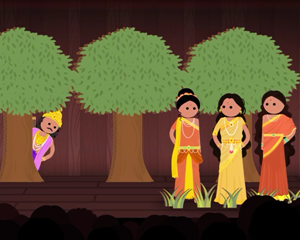(单词翻译:单击)
Which, I mean, makes sense. What director wants to manage the blocking for an army of monkeys?
我的意思是,这很合理,试想哪位导演会想替一群猴子开路呢?
Besides what types of plays there are, the Natyasastra has a lot of ideas about how plays should be staged.
除了介绍戏剧的类型,《舞论》里还讲述了很多有关戏剧表演的方法
Like Greek and Roman theater, Sanskrit theatre was often staged in conjunction with religious festivals and preceded by elaborate religious rituals.
和希腊戏剧和罗马戏剧一样,梵文戏剧通常也是和宗教节日一起上演,上演前还会举行复杂的宗教仪式
But UNLIKE Greek and Roman theater, players weren't exclusively men: troupes were male, female, and mixed gender.
但是和希腊戏剧罗马戏剧不同的是,演员们并不全是男人:剧团里有男有女,还有中性人
Plays were also sometimes commissioned as court performances.
戏剧有时也会被委任为宫廷表演
Bharata Muni says although the best spectators are noble, theater is for all classes.
婆罗达牟尼说:虽然贵族是最好的观众,但戏剧适合所有阶层的人群
Members of the four castes—priests, warriors, merchants, and peasants—all seem to have gone to the theater, though they didn't get to sit together.
四种阶层的成员——牧师、武士、商人和农民——好像都会去看戏剧,虽然他们不坐在一块儿
No classical Sanskrit theaters survive, and sadly we know nothing about their concession snacks.
没有一个古梵文剧院幸存下来,并且可悲的是,我们对他们的特色小吃一无所知
But Bharata Muni does have some pointers on architecture.
但是婆罗达牟尼确实有一些关于建筑的暗示性描述
Theaters could be rectangular, square, or triangular and small, medium, or large.
剧院可以是长方形的、正方形的、三角形的、小型、中型、大型
The medium-sized rectangle was the most popular design.
不大不小的长方形是最受欢迎的设计
And in case you're thinking, hey isn't bigger better, —turns out you're more right than you think, because large rectangles are reserved for the gods.
或许你在想,嘿,是不是越大越好,——事实证明你想的极对,因为大矩形是留给神用的
Half of the theater was for the audience, the other half was for the stage and the backstage.
剧院有一半供观众使用,另一半供舞台和后台使用
There were also four color-coded pillars, and the whole thing was meant to symbolize the entire universe. No pressure.
还有四根彩色的柱子,整个剧院象征着整个宇宙,毫无压力·
If you think that seems precise, wait until you hear about the acting.
如果你觉得那看似很精确,等听到演技的时候就知道了
Acting in the classical Indian theater is incredibly specific and highly stylized.
古印度剧院里的表演是非常具体和高度固定化的
The way a performer stands and blinks and crooks a finger and flares her nostrils—all of that is conveying vital information about her character and the circumstances of the play.
一个演员站立、眨眼、弯曲手指、张开鼻孔的方式——所有这些都在传达关于她的角色和戏剧环境的重要信息
The Natyasastra lists six ways you can move your nose, nine ways you can move your neck.
《舞论》列出了六种动鼻子的方式以及九种动脖子的方式
There are seven ways you can move your eyebrows, each with its own distinct meaning – from lowering "in envy, disgust and smelling" to contracted in "manifestation of affection".
有七种不同的动眉毛的方式,每一种都有其独特的含义——从“嫉妒、厌恶和气味”的递减到“表达爱意”的收缩
And don't even get Bharata Muni started on the eyes. Or the fingers. Or the feet.
所以不要让婆罗达牟尼盯你的眼睛、或者手指、或者脚
That said, it's communicating through emotion that matters most.
也就是说,情感交流是最重要的

Rhythm and music, costume and make-up, are also crucially important. Props, too. But not scenery. Sanskrit drama doesn't do scenery.
节奏、音乐、服装和化妆也至关重要,道具也很重要,但是舞台布景不重要,梵文戏剧不做舞台布景
To get a feel of how these plays…uh, played out, let's take a look at one of the most beloved Sankrit dramas, Kalidasa's "The Recognition of Sakuntala."
去感受一下这些戏剧……是怎样表演的,我们来看一下最受欢迎的梵文戏剧之一,迦梨陀娑(印度戏剧家,诗人)创作的《沙恭达罗》
No solid date for this one, but best guess: early in the common era.
没有确切的创作日期,最准确的猜测是:西元年早期
Thoughtbubble, You Better Recognize:
思想泡泡 最好认真看:
In the first act, King Dushyanta is out hunting deer near a bunch of hermitages when he decides to hide behind a tree, perving on some beautiful hermit maidens—especially Sakuntala.
第一幕里,国王杜尚安塔在一片隐居地附近猎鹿,他决定躲在一棵树后面偷窥几个美丽的隐居少女——特别是沙恭达罗
The king falls in love, but ooohhh dip, she's in the wrong caste!
国王坠入了爱河,但是,哦哦!该死!(印度社会中的)种姓不匹配!
The king mopes because he's soooooo in love with the hermit girl and is trying to find an excuse to see her.
国王闷闷不乐,因为他太爱那个隐居的女孩了,他想找个借口去见她
But then! Two youths come and ask him to protect the hermitage.
但后来!有两个年轻人前来请求他保护隐居地
Score! Before long, the king and Sakuntala confess their love.
机会来了!不久,国王和沙恭达罗互相坦白了他们对彼此的感情
By the next act, their wedding has taken place and also presumably sex.
接下来,他们举行了婚礼,可能还发生了性行为
Then the king has to leave to do king stuff.
然后国王必须离开去做国王该做的事情
Daydreaming, Sakuntala accidentally offends the touchy poet Durvasa.
做白日梦。沙恭达罗无意冒犯了敏感的诗人杜尔瓦娑
So he curses her, telling her that King Dushyanta will forget all about her until she presents him with a token, like the ring he conveniently left.
所以他诅咒她,告诉她国王杜尚安塔会忘记关于她的一切,除非交给国王一个信物,比如国王随手留下的戒指
Sakuntala, who is pregnant, brings the king his kingly ring, to bring to mind their forbidden fling.
怀孕的沙恭达罗给国王带来了他的国王戒指,让国王想起了他们之间被禁的风流韵事
But alas! The king fails to recognize her.
但是,唉!国王还是没能认出她来
And she's like, "But wait, I have this ring." which…fell into the Ganges.
她说:“等等,我有这枚戒指。”戒指掉进了恒河
Oops! Sakuntala leaves the palace dejected, and after a long while a fisherman finds what is clearly a KINGLY RING in the belly of a fish!
哦!沙恭达罗伤心地离开了宫殿,过了很久之后,一个渔夫在一条鱼的肚子里发现了一枚戒指,那枚戒指显然是国王的那枚
When the king sees it, he remembers Sakuntala, but is busy fighting demons.
国王看到它时不禁想起了沙恭达罗,但他当时正忙着跟恶魔交战
After the king defeats them, Indra rewards him with a ride through the heavens.
在国王打败恶魔之后,因陀罗神奖励给他一次飞天之旅
In the final act of the play, Act VII, the chariot lets the king off at a hermitage.
这出戏的最后一幕,第七幕里,战车让国王在一个隐居地下了车
And even after years, he recognizes Sakuntala … and his son!
此时已经过了多年,但国王竟认出了沙恭达罗和自己的儿子!
Thanks Thoughtbubble. Reunited and it feels so good! Yay! A happy ending! Harmony with the universe achieved!
谢谢思想泡泡。大团圆很棒!耶!一个美好的结局!实现了与世和谐的目标!
As you can see, a nataka is very different from its Greco-Roman counterparts.
如你所见,纳塔卡戏剧和希腊罗马版的戏剧有很大不同
Seven acts, a lots of events, a multiyear span, a ton of locations, and a distinct mix of tragedy and comedy and prayer and sex and hermits.
七幕、剧情多、时间跨度大、地点多、独特的悲喜剧交加、祈祷文、性和隐士
Sorta has it all. And then some! There was even a rampaging elephant.
差不多都有,还有一些!甚至还有一头暴走的大象
Somehow it all comes together to help the audience achieve that harmony with the universe.
所有的这些都在某种程度上帮助观众实现了与世和谐
Nice work, Kalidasa. Sanskrit drama thrived for hundreds of years.
好样的,迦梨陀娑(印度戏剧家,诗人),梵文戏剧兴盛了长达数百年的时间
But in the next episode we're going to go back to Rome to talk about the decline of drama.
下一集我们会返回到罗马来讨论戏剧的衰落
There's gonna be a whole mess of trouble from the Goths and the Visigoths, and then– for a bunch of centuries – no Western theater at all. Unless you count mimes.
哥特人和西哥特人会遇到一大堆麻烦,之后——很多个世纪以后——西方的剧院会彻底消亡,除非拿哑剧凑数
Turns out the Dark Ages means dark nights for theater, too! Get it, Yorick?
黑暗时代对戏剧来说也意味着黑夜!懂吗,尤里克?
Because a dark night is a night when there isn't a performance and a theater and it's closed…
因为“漆黑的夜”指的是“没有演出的晚上”,剧院都打烊了……
oof, tough customer, this guy… Okay! Until next time… curtain!
喔哦,挑剔的客人,这家伙… 好啦!下节课见… 闭幕!


